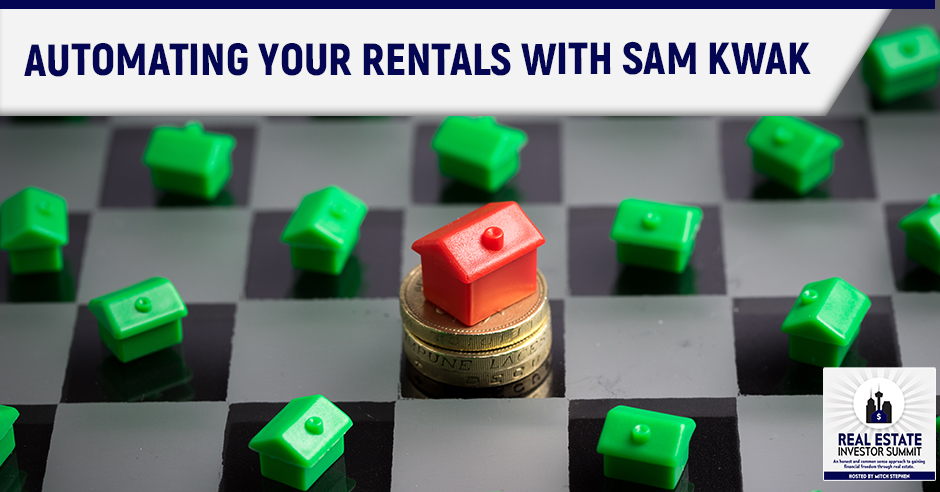PODCAST
Automating Your Rentals With Sam Kwak
Episode 382: Automating Your Rentals With Sam Kwak

For many of us, real estate is a way to live a freer life. However, for those in the rental property side of the industry, being an investor and being a landlord at the same time can be quite a lot of work, defeating the goals we have before entering. Host, Mitch Stephen, sits down with someone who has made it his mission to support other landlords by taking some of the tasks off their shoulders. He talks with Sam Kwak, the CEO and co-founder of Flowmatiks, a SaaS company that helps landlords and property managers automate and systemize their business. Here, Sam lets us in on how they are able to do that while taking us back to the beginning of his journey and the company. He then taps into some of the problems many amateur landlords have and gives a piece of advice or two on how they can up their game.
—
Watch the episode here
I have Sam Kwak and he’s going to be talking to us about rentals and how to automate. Before we get started, I want to pay homage to my sponsor TaxFreeFuture.com. If you don’t have a tax-deferred or tax-free environment in which to grow your finances or your retirement, then you have no idea the size of the tool you’re missing in your tool belt. Please visit their website. Watch the 37 little video vignettes. We won’t only show you how you set up so you can be in control of your own destination. We also show you how to do it because we’ve got a bunch of investors that have taken little bitty amounts of money and made them into big amounts of money in short periods of time. It’s simple but not obvious. We’ll show you how to do that. You will not believe what your financial advisors are not telling you. Sam, how are you?
I’m doing phenomenal.
You’re in the suburbs of Chicago. Tell us a little bit about your background.
I’m in the rental business. My brother and I got started in the real estate investing world back in 2014. As young college kids, all we wanted to do was have fun and coaster life. The only way to do that with having enough time to do fun and also make money was we thought, “We need to get into rental properties.” At the time, being young and dumb is all we wanted to do but we found a different purpose in life. When we first got started, we didn’t have money. We didn’t have credit. We didn’t have a dad who could lend us a small loan of $1 million. Although we would wish that but we got started with no money and no credit. All we had was podcasts like this, listening to podcasts, reading as many books as possible, and going through YouTube channels. We weren’t finding progress or we weren’t creating results. We felt more like a keyboard investor than a real estate investor.
It was until we joined the local community here like REIA, and then we ran across a guy like Mitch. He was seasoned and he had plenty of experience, and then we had some experience in social media. This gentleman didn’t so what we did is a little bit of a skill swap. We ended up working for this gentleman who had at the time 250 doors of rentals. We ended up working for this gentleman for free on top of what we were doing for college. He was teaching us and we were able to shadow him on what he was doing for his rental properties. There are a lot of details in between, but one thing that gave us this huge epiphany was the concept of owner financing, so we were on the other end, Mitch. You would sell properties on seller financing and we would buy them on seller financing. We will put a tenant in there and then we will essentially do a little bit of a wedge. We didn’t have to use our own credit.
A lot of times, for that downpayment of 10% or 5%, we would go and raise that money from a partner than to fund our downpayment. We will give that partner equity and then we would acquire properties that way. My part of the story comes in where my brother and I in 2017 acquired 77 rental units in one year, and that definitely put some stress on our management. Although one of our partners was a manager, we weren’t efficient and effective in eliminating human errors and collecting rents. I was running a marketing company at the time and I was automating a lot of different things.
For example, when a customer of mine will land on a specific web page, we would have back end software that would trigger automatic emails and text messages to reach out and follow up. I thought, “Why isn’t there a system like this in property management where if a tenant does something or doesn’t do something, there’s a customizable automated process that myself, as a landlord, can automate, send out emails and text messages to the tenant?” I scoured through different apps and software. I’m not going to name any of them, but none of these software had it. That’s my journey of, “I want to start helping other landlords automate this process.”
I knew there was a market because one particular property management company paid me $5,000 to come and consult and automate their systems. That’s when I started embarking on this journey of, “How do I help automate people’s business and make a streamlined system so that they can achieve what they wanted to do?” which was ultimately to buy rental properties and live a free life. That’s the gist of how I arrived at where I am with my business. Not just rental property, but helping people automate their business. My brother is on the acquisition side. He does all the investments and raising capital. I do more of how do we automate all this stuff? How do we create an engine that supports the business?
In real estate, certain neighborhoods and certain markets demand a certain level of attention. Share on XWhat’s your brother’s name?
His name is Daniel.
For a period of time, we’ve had a solid relationship before he passed away. His name was Ken D’Angelo. He was the Founder of HomeVestors. He said something to me that I didn’t take it to heart as much as I realized that to be true. He said that an entrepreneur rarely ends up with the business that he starts. He will always morph to the most amount of income with the least amount of resistance, and it’s hardly ever the idea that they start out to create. I find that to be true. I’m in eight businesses and the house flipping business is still the center of that hub. All these other businesses are offshoots of what was needed and what I couldn’t find or no one could help me with so I decided to do it myself or I had many customers coming in asking for it that I decided to quit saying no.
I had exhaust running out my tailpipe that was going to waste if I would add a service or whatever I could take what was exhausted out of my business and use it as a customer. For example, if you’re in the lumber business and you cut trees into logs, then you have a big pile of sawdust that you’ve got to do something with at the end of the day on your plant. Do you throw it away? Do you start making something out of sawdust? You decided you’re going to help people automate their collection process. Is that right?
Yeah. Not only rent a collection but what happens when tenants don’t pay. It’s probably why, Mitch, you left the rental business and you decide you want to do seller financing, but there are a lot of landlords that pull their hair out because they can’t collect rent and tenants won’t leave. They’ve been 3 or 4-months delinquent, and there has to be an eviction process for that, and landlords hate that. Repair maintenance is another reason why a lot of people choose to go into seller finance.
The real reason I left was the unpredictability of the income because you were responsible for every work from the back fence to the mailbox. It’s hard.
What I partly helped people automate is the maintenance process and procedures because landlords don’t want to get up at 2:00 in the morning to listen to tenants complain about how the water pressure on their toilet is low. It’s something stupid like that. That’s the entire encompassing aspect of property management. I try to help automate that whether you’re a landlord or property manager.

Automating Rentals: There are a lot of landlords that pull their hair out because they can’t collect rents, and tenants won’t leave.
You’ve got a free eBook that you’re giving away, Automate My Properties. I want you to go to REInvestorSummit.com/kwak. You’re going to get at least this free eBook if you go over there. Anything else you want to share, Sam? You can share if you have speaking dates, if you have new things come up, or if there are courses or anything you offer. At least go there to get your eBook. How long did it take you to develop and get all the kinks out of this program?
It didn’t come easy because a lot of it was based on what the market demands. There’s almost a different automation system for a C-class neighborhood and an A-class neighborhood. Certain neighborhoods and certain markets demand a certain level of attention. For example, some of your readers may be aware, but there’s a new solution, a new service that came out of auto showings. This is a concept where landlords or property managers get a lockbox connected to the internet and tenants who want to see the vacant property can do it themselves. They just pay $1 deposit on a credit card and they get a one-day code to go inside and look at it.
That will work well. That part of the automation worked well in B-class or A-class neighborhood, luxury markets, and affluent areas. I’ve seen small success, if not any, with C-class or lower type of neighborhood. Those types of neighborhoods do require a little bit more of a hands-on approach when it comes to showings. There are many different aspects of automation that depend on the market, management styles, and strengths and weaknesses, but I’ve been able to pinpoint what works for the general audience and what works for everybody. It took me a couple of months to get an idea and I have that brain. That’s where my strength lies in how do we take a power mesh and turn it into something that looks like an actual process? It streamlines like a factory.
How long have you been in the rental business?
Not long compared to you, Mitch. I’ve been doing it since 2017.
That’s when you run into problems as an early career. Life is happening. When you talk to people, are you talking to management companies? Are you talking to individual landlords?
I talk to both. I’m starting to single out my audience, specifically to the do-it-yourself landlords, folks that manage on their own. I feel like they’re struggling a lot. In the Coronavirus pandemic, you saw a lot of landlords unable to collect rents and struggling with the communication to talk to their tenants. I used to deal with primarily property managers until I found there wasn’t a whole lot of support for these smaller mom and pop landlords. These big property managers have the National Association of Realtors and property managers. They have a lot of advocacy groups supporting them, but not a lot of the do-it-yourself landlord groups. I’m here for the little guys, helping them scale, grow, and automate their properties.
Treat your rental as a business, not an after school activity or a hobby. Share on XThat’s a smart move. There are an awful lot of them. Go to REInvestorSummit.com/automatemyproperties. What’s one of the biggest problems that your software solves?
I try not to talk about it. I try not to pitch anything on podcasts. I’ll give you a little because I do want to give readers as much value as possible. The software essentially automates your workflow. What I mean by workflow is, for example, let’s say your tenant is late. There are a series of steps and sequences that you do to fix that problem, send a text message or email, and you call them. What this software allows you to do is it automates all that sending out emails, text messages, and you can customize when to send it, what to send, and how you send it. You can customize the timing of everything.
For you, Mitch, or anyone reading this that does seller finance notes, you can also use it for servicing aspects of it. If you want to service your debt, you can collect rent, and if they don’t pay and they’re delinquent, you can send out a text message or email letting them know, “You’re late.” That’s one use case for the software to automate the workflow of a landlord. There are all those other things like collecting rent, accounting, repair maintenance, ticket item, and tracking. It does everything that you’ll typically see on software but the workflow automation is what’s key to automating landlording.
One of the big problems in the rental business is your downtime. How do you streamline the time between a move-out and move in?
That’s such a big thing with amateur landlords that I see when it comes to automating. A lot of times, new landlords would almost sit around and wait. They’re like, “Someday, I’ll turn around the unit,” or “Someday, I’ll call the contractor. Someday I’ll get the carpet guy over there and replace the carpet.” I tell my audience, “You’ve got to get it turned around and if it’s not major, all repairs need to be done within fourteen days. Within fourteen days, you should have it listed on the market or Zillow or Apartments.com or Rent.com or wherever you want to list it. Once you’re done listing it in fourteen days, you should have secured a deposit or moving fee and at least sign. You have 28 to 30 days where you’re turning everything around.” I feel like a lot of small-time landlords, it takes them way longer because they don’t have a streamlined system. They don’t have a process. They don’t have a policy for, “What happens when someone is out? What happens when a property becomes vacant?” It almost has to be an instant thing. With ourselves for Flowmatiks, that’s what we tried to do. Even without the software, we should still be able to have that kind of system engraved in your head.
I interviewed the president of the Texas Apartment Association. He’s second-generation but he came from an exceptional entrepreneur who migrated here from Europe and they have thousands upon thousands of doors. One of the things that he said they focused on and that they are constantly trying to improve on is the time between the move out and the move in, which is critical. They’re a big company and they have some resources and stuff. They wanted to do it and within seven days, it’s got to be up and ready to go being shown. It’s credibly fast and responsive. Is it possible to streamline in the eviction process?
A lot of that hinges on how fast the court system is. I don’t want to say anything bad because I feel like all these things circle around.

Automating Rentals: Treat your business like a business and put a system and process in place. It not only saves you money and time, but you’re going to have less stress and less emotional quotes about it.
Government bureaucracy sucks. I don’t care what city you’re in. It sucks because it’s not their money. They don’t care and they want to get into your house for free because it doesn’t affect them.
I had a tenant, and I’ll say a tenant because I consider this person a tenant. She hasn’t paid and then in the court, they kept getting pushed. With this Coronavirus happening too, all the court systems shut down unless it’s an emergency. I was supposed to have a summon. I was supposed to show and I was supposed to be like, “If the judge grants me possession, I’m in.” It didn’t happen. It’s postponed, but there are states like my next-door neighborhood Indiana, Wisconsin where they can get their eviction done in two weeks. The court is open and the judge says, “I see all the good paperwork possession,” and you’ve got the sheriff out there in a matter of a few days, and that’s it. Here in different states like Illinois, New York, and California, you would wish that’s the case. The fastest I’ve seen when it comes to going to the regular thing is 2 to 3 weeks. What you’re alluding to is instead of paying an attorney for eviction fee or legal fee, there are ways to do Cash for Keys. That’s a classic term that a lot of flippers use to say, “Mr. and Mrs. Tenant, I’ll give you $1,000 if you move out in the next 30 days.”
“I’ll give you $1,000 if you move out by the weekend.”
I’m talking about Chicago, Mitch. When it takes 2 to 3 months to evict anybody here, 30 days, you’re content. If you can get it and get them out by the weekend, perfect. That’s how I would do it. It is an alternative to the legal process. I would have them sign off on a possession letter or agreement that turns over the possession. Two weeks, or in the case in Chicago, a month. “If you leave, here’s $1,000 or I’ll give you $500 now in good faith and $500 when you move out.” You never want to give the money away, and then they’re not moving out.
You’ve blown my whole myth about Chicago. I thought in Chicago, you just hire a guido and you send him over there.
Those days are long gone. I know people used to talk about it. They shut off the water because a lot of the water shutoff valves are in the streets, so they would shut the water off or they would take the doors off the hinges and walk away. Those were the days. Some of the seasoned landlords talk about that, but you can’t do that anymore.
I’ll tell you the trick that I always do, especially in my lower-income class-C. I always have a friend in the police department and see if they have any warrants because if they have any warrants, they’re going to be at my house in 24 hours. I’m not going to call the police on them, but I’m going to tell them, “I understand you have warrants. I have friends at the police department and they’ve let me know you have warrants. I’m fixing to let them know that you’re here if you’re here much longer.” A lot of my class-C people used to work on 30% of them. They had warrants for a driving ticket or didn’t pay. It was effective. Go to REInvestorSummit.com/automatemyproperties and get your free eBook and see what else Sam and Daniel have going on over there. Anything we need to cover before we wrap it up here? What do you say to the new guys?
Treat your rental as a business. I see many landlords treat this like an after-school activity or as a hobby. Not only does that hurt your business or your profitability, but it also hurts the overall tenant perception of landlords. If you treat this like a hobby and let’s say the tenant wants something fixed and it takes you five months to fix something like a dishwasher leak or whatever, honestly, that puts a bad perception and rep on everybody, all the landlords. Treat your business like a business and put a system and process in place. You’ll thank yourself for it because it not only saves you money and time, but you’re going to have less stress and less emotional quotes about it. That’s my little last suggestion and advice for everybody reading or you.
Sam, I appreciate you being on. I wish you the most luck. We’ll be talking in the future I’m sure. Go to REInvestorSummit.com/kwak and get your free eBook, Automate My Properties. I’d like to thank everybody out there for stopping by to get you some Sam Kwak and learn a little bit about how to automate and the importance of automation and time.
Important Links
- REInvestorSummit.com/KwakEBook
- REInvestorSummit.com/Kwak
- REInvestorSummit.com/livecomm
- REInvestorSummit.com/Moat
- REInvestorSummit.com/100
- REInvestorSummit.com/101
About Sam Kwak
 My brother and I went from 0 to 75 rental units in 1 year.
My brother and I went from 0 to 75 rental units in 1 year.
Now I help landlords automate their property management.











